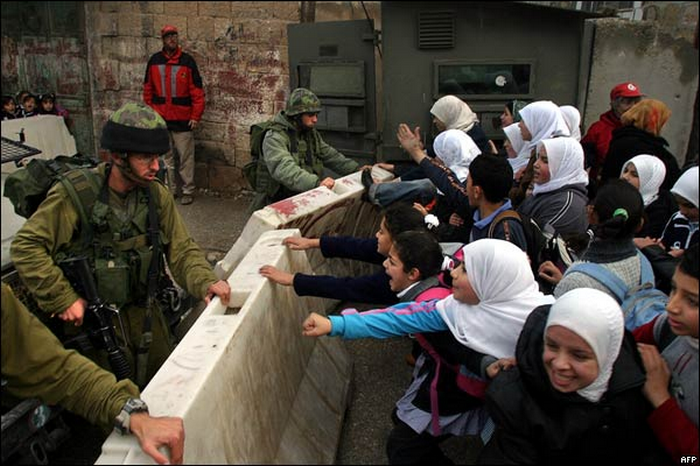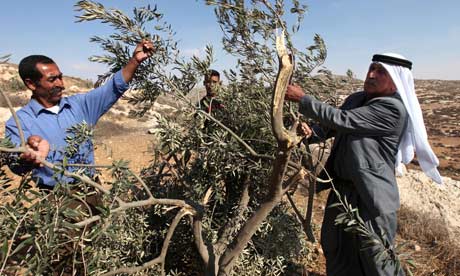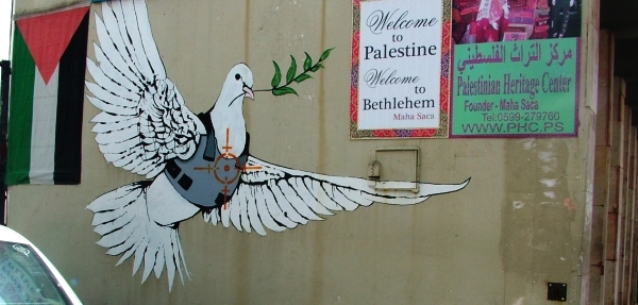Source(google.com.pk)
Israel Palestine Occupation Biography
Amnesty International's concerns are based on international standards and applied equally within the proper legal framework. The legal framework is defined by who retains jurisdiction, or effective control, over an area and the circumstances or situation at the time of the human rights violation. Amnesty's concerns within Israel-proper, the area inside the 1949 (W. Bank/E. Jerusalem) and 1951 (Gaza Strip) armistice lines (also called the '1967 borders') include but are not limited to, ill-treatment and torture of detainees, excessive use of force, the detention of conscientious objectors, and forced evictions and home demolitions within 'unrecognized' Bedouin villages.
The Israeli occupation of Palestinian territory (the West Bank including East Jerusalem and the Gaza Strip) is in its fifth decade and the undercurrent of violence and inherent abuses of fundamental human rights and disregard for international law inherent in any long-standing military occupation is presented by both sides. Both Israeli and Palestinian civilians continue to bear the brunt of the violence in the region.
Human rights violations by Israeli forces in the Occupied Palestinian Territories (OPT) have included, but are not limited to, home demolitions and the forced eviction of Palestinian families; punitive arrests, unfair trials, ill-treatment and torture of detainees and the use of excessive or lethal force to subdue nonviolent demonstrations as well as the use of restrictive legal means. In contravention of international law, Israel continues to build parts of the wall/fence in the OPT, expand settlements and use draconian restrictions on the movement of Palestinians with some 600 roadblocks and checkpoints. Amnesty International is also concerned about discriminatory policies affecting access to water for Palestinians.
In areas under control of the Palestinian Authority, concerns include, but are not limited to, excessive use of force, arbitrary arrests, ill-treatment, torture and the use of administrative detention to jail individuals without charge or trial. Some detainees also do not receive adequate medical attention.
A ceasefire between Israeli forces and Palestinian armed groups in the Gaza Strip in effect since 2009 has been generally respected. The Gaza Strip has been under increasing restrictions since 2005, when Israel unilaterally pulled troops and settlers out of the strip. June 2007, restrictions tightened to an almost air-tight blockade, deepening the hardship there and virtually imprisoning the entire population of 1.6 million.
Israel maintains effective control over Gaza, controlling all but one of the crossings into the Gaza Strip, the airspace, territorial waters, telecommunications and the population registry which determines who is allowed to leave or enter Gaza. Therefore, Israel is still considered the occupying power and is responsible for the welfare of the inhabitants in the strip under international humanitarian law.
Israeli authorities rejected or delayed hundreds of permit applications to leave Gaza by Palestinians requiring specialist medical treatment; a few died as a result. Most of Gaza's inhabitants depend on international aid, which is severely hampered by the blockade. In May 2010, Israeli forces killed nine men aboard an aid flotilla in international waters that was challenging the blockade's legality.
Amnesty also has concerns about the indiscriminate rocket fire into southern Israel by armed Palestinian groups. Palestinian militants fired a rocket into Israel that hit a school bus, killing a 16 year old boy April 2011.
Hamas continues to refuse Gilad Shalit, an Israeli soldier captured in 2006, visits by the International Committee of the Red Cross and regular communication with his family. And following hostilities between Israel and the Gaza Strip Dec. 2008 - Jan. 2009, Hamas has failed to conduct any domestic investigation into the serious allegations of violations of international humanitarian and human rights law committed by their forces during the conflict and Israel's investigations have been inadequate - failing to meet international standards.
Political Situation
Prospects for a just and durable resolution to the conflict are remote despite the fact that the Palestine Liberation Organization recognized the State of Israel in 1988 and Israel allowed the Palestinian leadership to return to the Occupied Territories under the Oslo Accords in 1994. Israel continues to violate international law by expanding settlements in the occupied West Bank and East Jerusalem and the Palestinian Authority appears to have given up on direct negotiations, planning to go directly to the United Nations to seek official recognition of the State of Palestine within the '1967 borders' against the wishes of the Israeli government.Serious human rights violations continued in 2011 in the Occupied Palestinian Territories (OPT). Israeli soldiers used unnecessary lethal force against demonstrators in the Israeli-occupied Golan Heights and across the border in Lebanon. Israeli military attacks in Gaza and policing operations in the West Bank resulted in the deaths of at least 37 civilians.
Israel continued to block exports from, and many imports to, the Gaza Strip, hindering the rebuilding of Gaza’s devastated economy. In the West Bank, including East Jerusalem, Israel demolished a record number of Palestinian homes under discriminatory practices, imposed severe restrictions on Palestinian freedom of movement, continued to build unlawful settlements, and arbitrarily detained peaceful protesters, including children.
Palestinian armed groups in Gaza launched hundreds of rocket attacks at Israeli population centers in 2011, killing two civilians and seriously injuring at least nine others; indiscriminate mortar attacks seriously injured at least four civilians in Israel. Another attack fatally injured an Israeli youth in a school bus. Egyptian attackers whom Israel claimed operated in coordination with armed groups in Gaza crossed the Egyptian border and killed six Israeli civilians.
Hamas authorities carried out three judicial executions in 2011 after unfair military trials, and allegedly tortured scores of detainees, some of whom died in custody.
The Palestinian Authority's (PA) security services arbitrarily detained hundreds of Hamas supporters as well as politically unaffiliated protesters who supported the pro-democracy Arab Spring movements and reconciliation between Hamas and Fatah. The PA also arrested journalists who were critical of the authorities. Credible allegations of torture by the PA's security services continued.










Israel Palestine Occupation Biography
Amnesty International's concerns are based on international standards and applied equally within the proper legal framework. The legal framework is defined by who retains jurisdiction, or effective control, over an area and the circumstances or situation at the time of the human rights violation. Amnesty's concerns within Israel-proper, the area inside the 1949 (W. Bank/E. Jerusalem) and 1951 (Gaza Strip) armistice lines (also called the '1967 borders') include but are not limited to, ill-treatment and torture of detainees, excessive use of force, the detention of conscientious objectors, and forced evictions and home demolitions within 'unrecognized' Bedouin villages.
The Israeli occupation of Palestinian territory (the West Bank including East Jerusalem and the Gaza Strip) is in its fifth decade and the undercurrent of violence and inherent abuses of fundamental human rights and disregard for international law inherent in any long-standing military occupation is presented by both sides. Both Israeli and Palestinian civilians continue to bear the brunt of the violence in the region.
Human rights violations by Israeli forces in the Occupied Palestinian Territories (OPT) have included, but are not limited to, home demolitions and the forced eviction of Palestinian families; punitive arrests, unfair trials, ill-treatment and torture of detainees and the use of excessive or lethal force to subdue nonviolent demonstrations as well as the use of restrictive legal means. In contravention of international law, Israel continues to build parts of the wall/fence in the OPT, expand settlements and use draconian restrictions on the movement of Palestinians with some 600 roadblocks and checkpoints. Amnesty International is also concerned about discriminatory policies affecting access to water for Palestinians.
In areas under control of the Palestinian Authority, concerns include, but are not limited to, excessive use of force, arbitrary arrests, ill-treatment, torture and the use of administrative detention to jail individuals without charge or trial. Some detainees also do not receive adequate medical attention.
A ceasefire between Israeli forces and Palestinian armed groups in the Gaza Strip in effect since 2009 has been generally respected. The Gaza Strip has been under increasing restrictions since 2005, when Israel unilaterally pulled troops and settlers out of the strip. June 2007, restrictions tightened to an almost air-tight blockade, deepening the hardship there and virtually imprisoning the entire population of 1.6 million.
Israel maintains effective control over Gaza, controlling all but one of the crossings into the Gaza Strip, the airspace, territorial waters, telecommunications and the population registry which determines who is allowed to leave or enter Gaza. Therefore, Israel is still considered the occupying power and is responsible for the welfare of the inhabitants in the strip under international humanitarian law.
Israeli authorities rejected or delayed hundreds of permit applications to leave Gaza by Palestinians requiring specialist medical treatment; a few died as a result. Most of Gaza's inhabitants depend on international aid, which is severely hampered by the blockade. In May 2010, Israeli forces killed nine men aboard an aid flotilla in international waters that was challenging the blockade's legality.
Amnesty also has concerns about the indiscriminate rocket fire into southern Israel by armed Palestinian groups. Palestinian militants fired a rocket into Israel that hit a school bus, killing a 16 year old boy April 2011.
Hamas continues to refuse Gilad Shalit, an Israeli soldier captured in 2006, visits by the International Committee of the Red Cross and regular communication with his family. And following hostilities between Israel and the Gaza Strip Dec. 2008 - Jan. 2009, Hamas has failed to conduct any domestic investigation into the serious allegations of violations of international humanitarian and human rights law committed by their forces during the conflict and Israel's investigations have been inadequate - failing to meet international standards.
Political Situation
Prospects for a just and durable resolution to the conflict are remote despite the fact that the Palestine Liberation Organization recognized the State of Israel in 1988 and Israel allowed the Palestinian leadership to return to the Occupied Territories under the Oslo Accords in 1994. Israel continues to violate international law by expanding settlements in the occupied West Bank and East Jerusalem and the Palestinian Authority appears to have given up on direct negotiations, planning to go directly to the United Nations to seek official recognition of the State of Palestine within the '1967 borders' against the wishes of the Israeli government.Serious human rights violations continued in 2011 in the Occupied Palestinian Territories (OPT). Israeli soldiers used unnecessary lethal force against demonstrators in the Israeli-occupied Golan Heights and across the border in Lebanon. Israeli military attacks in Gaza and policing operations in the West Bank resulted in the deaths of at least 37 civilians.
Israel continued to block exports from, and many imports to, the Gaza Strip, hindering the rebuilding of Gaza’s devastated economy. In the West Bank, including East Jerusalem, Israel demolished a record number of Palestinian homes under discriminatory practices, imposed severe restrictions on Palestinian freedom of movement, continued to build unlawful settlements, and arbitrarily detained peaceful protesters, including children.
Palestinian armed groups in Gaza launched hundreds of rocket attacks at Israeli population centers in 2011, killing two civilians and seriously injuring at least nine others; indiscriminate mortar attacks seriously injured at least four civilians in Israel. Another attack fatally injured an Israeli youth in a school bus. Egyptian attackers whom Israel claimed operated in coordination with armed groups in Gaza crossed the Egyptian border and killed six Israeli civilians.
Hamas authorities carried out three judicial executions in 2011 after unfair military trials, and allegedly tortured scores of detainees, some of whom died in custody.
The Palestinian Authority's (PA) security services arbitrarily detained hundreds of Hamas supporters as well as politically unaffiliated protesters who supported the pro-democracy Arab Spring movements and reconciliation between Hamas and Fatah. The PA also arrested journalists who were critical of the authorities. Credible allegations of torture by the PA's security services continued.
Israel Palestine Occupation

Israel Palestine Occupation

Israel Palestine Occupation

Israel Palestine Occupation
Israel Palestine Occupation

Israel Palestine Occupation
Israel Palestine Occupation

Israel Palestine Occupation

Israel Palestine Occupation
Israel Palestine Occupation

Israel Palestine Occupation
No comments:
Post a Comment